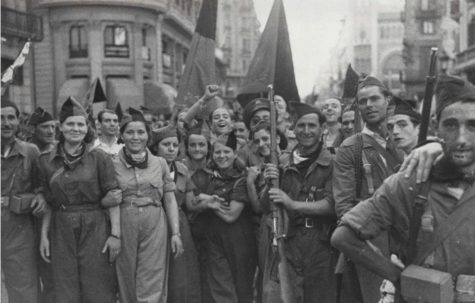Anarchism: Mankind’s Inevitable Next Stage
November 6, 2017
When the word “anarchy” comes to mind, the first images that come to people’s minds are pictures of violence, chaos, and disorder. This idea of anarchy is almost always wrongly conflated with anarchism, the philosophy fathered by Pierre-Joseph Proudhon. Contrary to popular belief (not to mention more than a hundred years of anti-leftist propaganda) anarchism is not a state of pandemonium, but rather a rejection of all unjust social hierarchies.
Anarchism, a portmanteau of the words “anti” and “hierarchy”, hopes to establish a society in which there is no money, no state, and no classes, as well as collective ownership of the means of production. Much like Marxism, anarchism is a rejection of the current state of capitalism that hopes to advance humanity to a higher plane in which everyone has equal footing in society and has access to a comfortable standard of living. Most schools of anarchist thought plan to achieve this by organizing working class individuals into cohesive units that can resist the oppressive nature of capital and staging a revolution that dismantles the state.

In theory, anarchism is a far better alternative to capitalism, because a global anarchist society would eliminate the harmful situations that result from capitalism, such as poverty, exploitation, and constant war and violence. A society in which commodity production is ended and goods are made for and provided to all within a given community would see the end of poverty. A society in which workers are directly rewarded with the fruit of their labor rather than having it stolen by their boss would see the end of wage theft and labor exploitation. A society in which there are no borders and no forced scarcity would see the end of the never ending strife that has plagued humanity for millennia. Anarchism would abolish the dystopia that global capitalism has forced the world in to. Rather than serving to only empower the elite few of humanity at the expense of the many, anarchism would enable the silent and impoverished masses to take back what was stolen from them and create a system in which everyone’s needs are met.
Throughout history, there are many examples of attempts at establishing anarchist societies. In 1918, during the Russian Revolution and subsequent civil war, Nestor Makhno’s Revolutionary Insurrectionary Army formed “free soviets” in southeastern Ukraine, known as the Free Territory, which had a population of 7 million people. The society organized itself along the principles of decentralized leadership, social justice, and worker solidarity. The Free Territory opposed the authoritarian dictatorship in Moscow and instead operated along anarchist ideas by creating: a system of free exchange of goods between urban and rural communities, a true democratic society of worker and peasant councils, and a guarantee of freedom of speech, press, assembly, and unions.

In addition to the Free Territory in Ukraine, there were many successful endeavors at creating anarchist societies all across the globe including Revolutionary Aragon and Catalonia, the Shinmin Prefecture in Manchuria, and the Paris Commune. There are also current anarchist territories in Rojava, Syria and Chiapas, Mexico. All of these experiments in establishing anarchism had much success until they were all met intense imperial and capitalist resistance. The modern superstructure of capitalist organization has created a world in which attempts at improving people’s lives are violently repressed. Capitalism has been showing its cracks for a long time now, with the increasing rates of international poverty, hunger, and illness. As society continues to collapse all around us, humanity will soon be faced with one final decision – anarchism or barbarism. Which will you choose?



Joyce Zhong • Dec 12, 2017 at 8:55 pm
Thoroughly enjoy reading Ivan’s takes on leftist politics. Not only are they accurate, but incredibly eloquent and easy to follow. Great job and keep it up! I’m very proud.
Ivan Anyanwu • Dec 14, 2017 at 10:26 am
Thanks Joyce! I’m looking forward to liberating the working class with you sometime in the future.